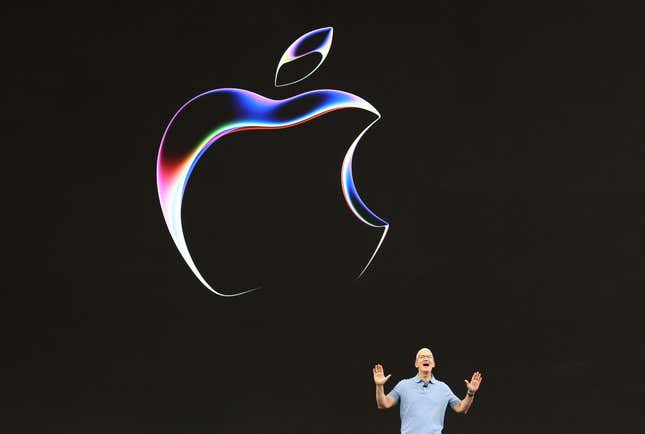
Apple is having a terrible 2025. The company that dominated tech for over a decade is suddenly battling challenges on three critical fronts: a damaging legal defeat that could upend its App Store business model, mounting tariff costs eating into profits, and significant delays in its AI strategy that have competitors pulling ahead.
The most immediate blow came last week when U.S. District Judge Yvonne Gonzalez Rogers found Apple in contempt of court for willfully violating her 2021 injunction in the Epic Games case. The ruling was unusually harsh, accusing Apple of deliberately circumventing the court’s orders by implementing a 27% commission on developers who directed users to external payment options — lower than its standard 30% rate.
“Apple knew exactly what it was doing and at every turn chose the most anti-competitive option,” Judge Rogers wrote, accusing Apple’s Vice President of Finance, Alex Roman, of having “outright lied under oath” about the company’s decision-making process. The judge referred the matter to federal prosecutors to consider criminal contempt proceedings — an extraordinary step for a company of Apple’s stature.
The ruling immediately bars Apple from restricting developers’ communication with users about alternative payment options and prohibits the company from imposing commissions on external purchases. This represents a significant blow to Apple’s App Store revenue model, which has been a key driver of its increasingly important services business. Services revenue, which includes the App Store, accounted for more than 28% of Apple’s total quarterly revenue in its most recent earning report, making it the company’s second-largest revenue category after iPhone sales. Apple has appealed the decision.
Meanwhile, CEO Tim Cook revealed during the company’s earnings call that President Donald Trump’s tariff policies would add about $900 million to Apple’s costs in the current quarter alone. When asked about future impacts, Cook said predicting beyond June is “very difficult” given the uncertain trade environment.
In response, Apple is rapidly reconfiguring its supply chain. Cook announced that the majority of iPhones sold in the U.S. will now come from India rather than China, with other devices being sourced from Vietnam. While this shift demonstrates Apple’s supply chain flexibility, it comes with substantial operational challenges and costs.
Perhaps most concerning for Apple’s long-term outlook is its faltering AI strategy. In March, the company confirmed that its most anticipated Apple Intelligence features — particularly enhancements to Siri — would be delayed until “the coming year.” These postponed capabilities, which include Siri’s ability to understand personal context across apps and perform complex actions, were prominently featured in TV commercials that Apple has since pulled.
As influential tech blogger John Gruber of Daring Fireball noted in a post ominously titled “Something is Rotten in the State of Cupertino,” what makes Apple’s AI delays so troubling is how they break the company’s decades-long pattern of reliability. Gruber called the situation a “fiasco” in which Apple essentially promoted AI capabilities it couldn’t deliver. He observed that Apple had built an exceptional record of credibility over 30 years — if it showed or promised a feature, customers could count on it arriving as scheduled. The fact that Apple never demonstrated the “more personalized Siri” features to the press, even in controlled environments, suggests they may have been far less developed than Apple led consumers to believe.
This AI stumble is particularly problematic as competitors such as Google, Microsoft, and OpenAI continue advancing their artificial intelligence offerings. For a company that has positioned itself as an innovation leader, falling behind in what many consider the next technological revolution threatens to undermine Apple’s premium brand position.
Wall Street has noticed these converging problems. Apple shares have declined about 20% so far this year, with the legal setback triggering another sharp drop last week. For investors accustomed to Apple’s seemingly unstoppable growth, the setbacks raise questions about the company’s future trajectory.
For a company built on controlling everything from silicon to storefront, these external challenges represent unfamiliar territory. In a twist of irony, Epic Games’ Fortnite will return to the iOS App Store next week after almost five years of absence — though with a creative workaround. Since Apple terminated Epic’s U.S. developer account in 2020, CEO Tim Sweeney confirmed they’ll be using their Swedish subsidiary account to submit Fortnite to the U.S. App Store.
Meanwhile, Sweeney has offered Apple a “peace proposal”: extend the court-ordered changes worldwide, and Epic will drop all litigation. For iOS users who have been unable to play one of the world’s most popular video games since 2020, that’s perhaps the one silver lining in Apple’s storm cloud of a year.
—Jackie Snow, Contributing Editor